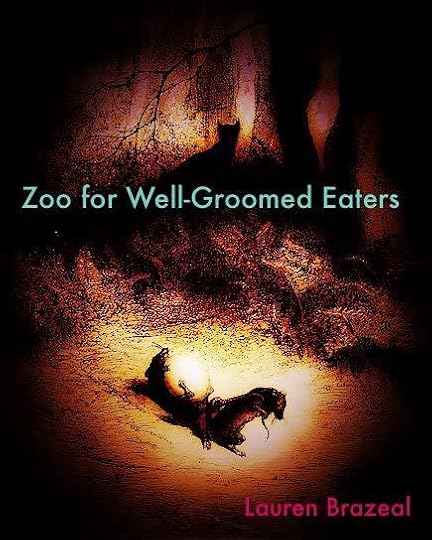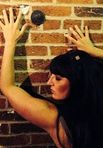Carpe Noctem Chapbook Interview With Lauren Brazeal
 dancing girl press & studio, 2016 THINGS WE’RE DYING TO KNOW…
dancing girl press & studio, 2016 THINGS WE’RE DYING TO KNOW…If I asked you to describe or sum up your book, what three words immediately come to mind?
Fatty, succulent, and nipple
What were you trying to achieve with your chapbook? Tell us about the world you were trying to create, and who lives in it?
Food is a big thing in my life. I was homeless when I was a teenager, and then lived in group homes where food was closely monitored and I had no say over what I ate. I suppose because of this, themes of “eating” run rampant in my poems, my day-to-day conversations, and even my metaphors. “Consumption”—and its various uses as a verb in our language—is the great unifier of every poem in the book. I'm not sure if it was my goal when I started, but that seems to be the final product.
Zoo for Well-Groomed Eaters exists as a current of savagery running beneath a veneer of civility. Its citizens are mostly outsiders, living in the back alleys of human consciousness; and include scholarly mongrel dogs lecturing on how to handle cats—with interruptions, cockroaches who write thank-you notes to their hosts, animals bred solely for human consumption, and mother rats singing ballads to their starving children. But there's also a great humor to the collection—even if it may be from the gallows. Most of these poems are armed with a wicked smirk.
Can you describe your writing practice or process for this collection? Do you have a favorite revision strategy?
Most poems in this collection were written while I was earning my MFA at Bennington College. So my writing practice was that of most MFA students: I had monthly deadlines, was required to offer my work for review and workshop, and—as with any workshopping environment—was given either a thumbs up or down regarding my progress. My revision strategy is my own, and involves a more “crockpot” approach—again with the food metaphors. I combine various ingredients, let them sit, and see if the flavor is right after a certain amount of time. This makes me a slow writer for the most part, but I'm usually happy with the result of my efforts.
How did you order the poems in the collection? Do you have a specific method for arranging your poems or is it sort of haphazard, like you lay the pages out on the floor and see what order you pick them back up in?
My favorite collections are those which invite a multitude of reading approaches—either read front to back, or different pieces at random—with each reading offering its own unique perspective on the text as a whole. I was careful to arrange the pieces in Zoo for Well-Groomed Eaters to function more like movements in a symphony; I feel there's a beginning, middle, and end. But I hope the reader can just as easily pick the book up, select a poem at random, and not feel lost.
What do you love to find in a poem you read, or love to craft into a poem you’re writing?
There's a quote from an anonymous child that says. “A poem is an egg with a horse in it." I look for poems that surprise me with their magic. After all, poetry is the grandchild of the magic spell. I look for this as I read, and keep this in mind whenever I write.
Can you share an excerpt from your book? And tell us why you chose this poem for us to read—did it galvanize the writing of the rest of the collection? Is it your book’s heart? Is it the first or last poem you wrote for the book?
This poem may be my favorite in the collection, so it was easy to choose. I'm a great fan of form, and meter and this epistle began as a petrarchan sonnet that mutated—though it retains plenty of iambic rhythm, and there's a discernable volta. I wrote it for a student reading at Bennington, which are famous for their raucousness. When I return to it now, I still see the Bennington Commons surrounded by snowdrifts; the Commons lounge, with its grand fireplace, filled from corner to corner with maybe 60 less-than-sober MFA candidates. I can hear the hoots and hollers of my friends with each line break. I think the poem embodies that sense of gleeful abandon. I'm not sure if it's the book's heart—I think the book has many hearts, but it's a good example of what a reader will find in Zoo for Well-Groomed Eaters.
Dear Spring,
You're just too spooky
with your ovuleescent
pistils, and your stamens
thrusting powdery
yellow gunk that drives
the bees insane.
You're loud, parading
greenly in the streets
past 2:00am, bottle-
brushing branch tips
labia pink. You stink
of sex and insects,
and you encourage other birds
to bedroom-eye
the trees. Spring, sweetie,
your drag show's bad.
Fuchsia's just
so 1985.
Just look at you in June,
your leggy legs
no longer steady.
Your song was pretty once,
but yaws off-key. Now,
get clean, and clear your craw
for another gobbling
of tits in tassels and
conveniently revealing
boudoir screens.
If you had to convince someone walking by you in the park to read your book right then and there, what would you say?
“These poems will get you laid.”
What are you working on now?
I've got a full-length manuscript I'm polishing and beginning to submit, which is a series of odd poems, flash-fiction pieces, board games, palimpsests, instruction manuals, and stolen police evidence all telling the story of my time on the streets when I was a teenager. I'm also working on what I thought was a finished third chapbook manuscript, but recently realized—to my excitement—is a portion of a second full-length.
What book are you reading that we should also be reading?
Right now I'm reading the amazingly talented Detroit poet, Francine J. Harris. I love her work so much! I'm also re-reading Megan Martin's beautifully genre-bending debut, Nevers. Chapbooks I've enjoyed recently are Lisa Marie Basile's War/Lock, Thera Webb's Reality Asylum, and Sarah B Boyle's What's Pink & Shiny / What's Dark & Hard.
***
Purchase Zoo for Well-Groomed Eaters from dancing girl press & studio.

Lauren Brazeal teaches writing in the Dallas / Forth Worth metroplex but in her past she's been a homeless gutter punk, a resident of the Amazon jungle, a maid, and a custom aquarium designer. Her second chapbook, Exuviae, is forthcoming from Horse Less Press in 2016 and her individual poems have appeared or are forthcoming in DIAGRAM, Smartish Pace, Verse Daily, Barrelhouse Online, and Painted Bride Quarterly among other journals. Find her online at http://www.laurenbrazeal.com.
Published on May 24, 2016 11:15
No comments have been added yet.



